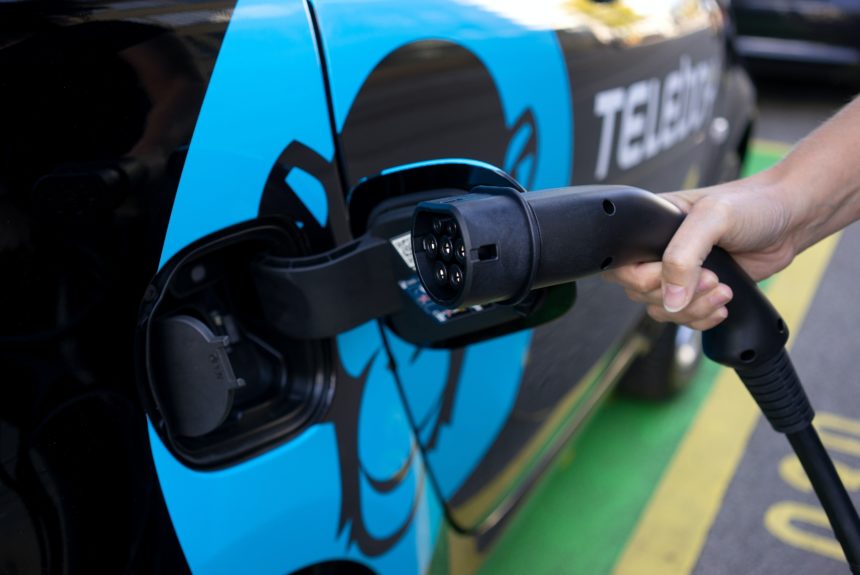Hydrogen is the world’s most abundant element, and could be a solution to lowering our CO2 emissions, specifically as hydrogen fuel. There are four different methods of hydrogen fuel production, but the two that are the most commonly used are thermal processes and electrolytic processes. Thermal, the most carbon-intensive, involves using hydrocarbons (often from natural gas) and steam to produce hydrogen fuel. Electrolysis involves separating the hydrogen and oxygen molecules in water. On top of being useful as fuel, hydrogen can also store energy for long periods of time–although today it is mostly used in fertilizers.
Depending on the production method, hydrogen is labeled either green, grey, or blue. Green hydrogen is the cleanest of the three and is produced through electrolysis with clean energy sources, such as renewables or nuclear energy. Grey hydrogen uses fossil fuels, mostly natural gas. Blue hydrogen is made by splitting hydrogen from methane, leaving behind CO2 that can be sequestered. Due to its abundance and versatility, hydrogen is becoming increasingly attractive for lowering our carbon footprint across a variety of economic sectors.
Facts vs. Myths
- MYTH: Hydrogen is a source of energy.
- Hydrogen is an energy carrier, not an energy source.
- FACT: Today, 99% of hydrogen fuel production is sourced from fossil fuels.
- MYTH: Hydrogen energy is a new concept.
- The idea of using hydrogen to produce electricity has existed since the 1800s.
The Benefits of Hydrogen Fuel:
- Hydrogen fuel has clean energy potential.
- Depending on the production source, hydrogen can have a small CO2 footprint.
- Solar-based alkaline electrolysis emits an estimated 2.0-2.3kg of CO2 per 1kg of hydrogen produced.
- Conversely, 1kg of hydrogen produced from fossil fuels produces 9.3kg of CO2.
- Solar-based alkaline electrolysis emits an estimated 2.0-2.3kg of CO2 per 1kg of hydrogen produced.
- The Hydrogen Council estimates that using hydrogen fuel in the transportation, power generation, and heating sectors could abate up to 6 gigatons of CO2 globally by 2050, equivalent to removing 43 million cars from the road.
- Depending on the production source, hydrogen can have a small CO2 footprint.
- Hydrogen fuel can be important for decarbonization goals.
- With capacity factors of less than 50%, renewable energy needs substantial energy storage solutions to make up for its intermittency.
- By being able to store energy for days at a time, hydrogen is one of the leading, low-cost options for renewable energy storage.
- The International Renewable Energy Agency (IRENA) called hydrogen the “missing link” for scaling up renewable energy across the globe.
- Hydrogen fuel is versatile.
- Hydrogen fuel is produced from a variety of methods and different sources, including natural gas, nuclear, and renewables.
- Hydrogen could help decarbonize various sectors of our economy.
- Industrially, hydrogen could replace natural gas as a reducing agent in steel production and be used in the production of cement and fertilizers.
- In transportation, non-emitting hydrogen-powered vehicles could replace long-haul and passenger vehicles.
- In buildings, hydrogen could be injected into existing grid infrastructure, effectively lessening the amount of natural gas necessary for heating.
Markets vs Mandates
- While the political and economic environment is favorable for hydrogen fuel production, it is still expensive to create and implement low-carbon hydrogen. There are several reasons for this:
- Current hydrogen production from clean energy sources is costly, due in part to high material costs and inefficient hydrogen extraction processes.
- A lack of available infrastructure, such as hydrogen recharging stations and pipeline access, is also hindering further adoption.
- The private sector is making significant investments into hydrogen production.
- In its 2021 report, the Hydrogen Council estimates that total global investments into hydrogen production will exceed $300 billion by 2030.
- Airbus announced it will release a line of hydrogen-powered airplanes by 2035.
- Siemens Energy is investing significantly into lowering the cost of hydrogen.
- Car companies, including Toyota, have brought hydrogen-powered vehicles to market.
How to Accelerate Clean Hydrogen Fuel Production
- Continue federal research and development into hydrogen, as seen in the Department of Energy’s Hydrogen Program.
- Rightsize regulations to allow for safe blending of hydrogen in natural gas.
- Allow market forces to work.
- This would lead to more cost competitive prices. With robust international and domestic investment into hydrogen, the private sector will lead the production of abundant and affordable hydrogen fuel.
Summary
- Hydrogen fuel is an abundant and versatile source of fuel.
- Hydrogen fuel can be applied to various sectors of the economy including transportation, energy, and heavy industry.
- With robust private sector involvement, hydrogen use could grow significantly to meet energy needs and environmental objectives.


